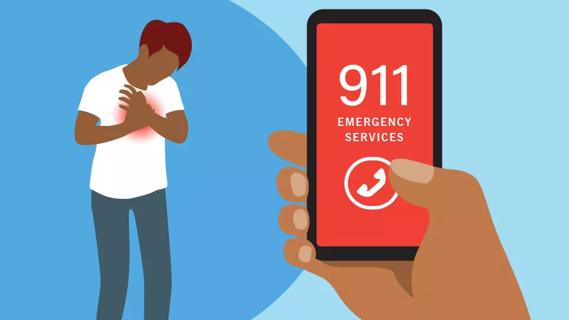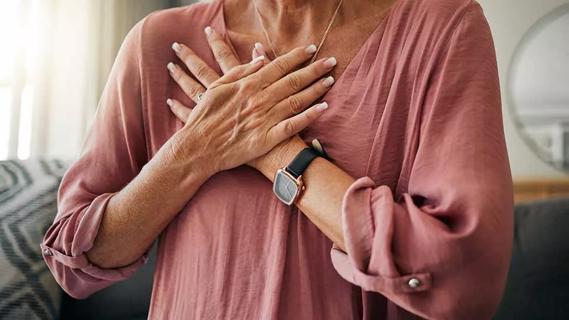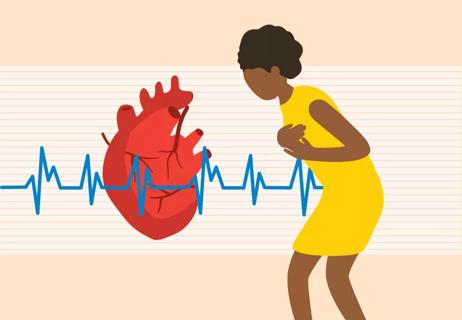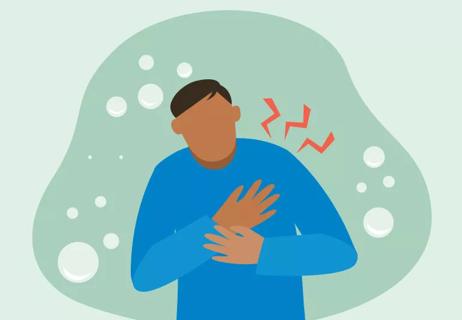Advertisement
If your provider has ruled out a serious cause, you can treat chest pain at home with antacids, inhalers or anti-inflammatory medications

Chest pain can be scary — and your initial thought might be, I’m having a heart attack.
Advertisement
Cleveland Clinic is a non-profit academic medical center. Advertising on our site helps support our mission. We do not endorse non-Cleveland Clinic products or services. Policy
While chest pain can be a sign of a serious health condition, it’s not always dangerous. And sometimes, you can treat chest pain at home.
Knowing when to go to the emergency room for chest pain can be challenging, says interventional cardiologist Laura Young, MD. So, it’s always best to be on the safe side.
“In general, seek medical attention right away if it’s a new pain that started suddenly,” she advises. “If you have any doubt about what’s causing your symptoms, get immediate care.”
Dr. Young explains more about what causes chest pain, when to get help and how to treat it at home.
Chest pain is one of the most common reasons people go to the emergency room. Most of the time, the cause isn’t due to a heart attack or other life-threatening condition.
So, when should you worry about chest pain? According to Dr. Young, chest pain might be serious and require emergency care if it:
If a healthcare provider ruled out a heart attack and you’re still having chest pain, you can try treating it at home. Dr. Young recommends checking in with your primary care provider even if your symptoms are mild. They can determine the cause of chest pain and help guide your care.
Advertisement
Gastrointestinal chest pain is often due to something you ate or drank. It can feel like heartburn or a heart attack. You may experience this chest pain when swallowing or after:
If your chest pain is associated with food, try an antacid medication, suggests Dr. Young. Tracking what you eat can also help you identify your triggers, so you can eliminate those items from your diet. Eating more fruits and vegetables, whole grains and fermented foods can also improve your gut health naturally.
If you feel the pain is due to food getting stuck in your chest, the cause could be an esophageal motility disorder. Your esophagus opens and closes to move food from your mouth to your stomach. If your esophageal muscles don’t work properly, food may get stuck. It’s important to see a healthcare provider so they can diagnose and treat this condition, says Dr. Young.
At-home strategies to address lung-related chest pain are limited. If you have asthma, try your inhaler.
Other lung conditions that cause chest pain should prompt a call to a provider. This is true especially if you’re having other symptoms, like:
Some people complain of chest pain from vaping. “Vaping can cause lung disease,” says Dr. Young. “Quitting vaping isn’t easy, but it’s the best thing you can do for your health.”
You typically feel musculoskeletal chest pain in a specific area. The pain likely gets worse when you press on it or take a deep breath. If this is the case, the best home treatment is rest, ice and anti-inflammatory medications.
“In patients with a known history of coronary artery disease, aspirin is a mainstay in our treatment strategy to reduce the risk of a heart attack,” notes Dr. Young. “If you have a known history of heart disease and are having symptoms that you are concerned may be a heart attack, the most crucial step is to call emergency services so they can respond in a timely manner. Taking a full dose of aspirin (325 milligrams) while waiting may help to reduce the risk of heart damage as well.”
Often, heartburn is due to an imbalance of the acid levels in the stomach lining. Baking soda mixed with warm water or low-fat milk can sometimes help neutralize the acid and resolve symptoms.
A panic attack is easy to confuse with a heart attack. Both cause sudden chest symptoms and sweating. The main difference is the type of chest pain you feel:
Dr. Young says if you’ve never had anxiety or a panic attack before, call a provider or 911. Anxiety is usually psychological, but it can also be caused by a physical condition, including a heart attack.
Advertisement
When having a heart attack, women tend to present at the ER later than men. This may be because they’re more likely to attribute their chest pain to anxiety or other conditions.
If panic is causing your chest pain, try these strategies to help stop a panic attack:
Getting help for panic attacks is essential to your health and wellness. Therapy, medications and other treatments can not only help get rid of chest pain, but they can also help you get the most out of life.
In any scenario, emotional stress can play a significant role. So, if at any point you’re concerned about your safety, or you’re experiencing these symptoms for the very first time, treating the situation as if it’s an emergency may be an important part of treating your condition.
“At the end of the day, there are a multitude of possible conditions that can cause chest pain. I, therefore, urge all patients to ensure that they are seeking medical attention as quickly as possible for new symptoms, so we can make a diagnosis and get them on the right treatment path as quickly as possible,” encourages Dr. Young.
Advertisement
Learn more about our editorial process.
Advertisement

Xylitol in processed food can increase risk of heart attack and stroke — but there’s no danger in xylitol in oral care products

Absolutely! In fact, in many ways, exercise is key to recovery

There’s no way to stop it once a heart attack is happening, but the most important thing you can do is to call for help

To help determine what you’re experiencing, focus on how the pain feels, the location of the pain, when it started and how long it lasts

It’s fine for most, but it can worsen heartburn and ulcers if you’re prone to them

Don’t ignore chest pressure that lingers and can’t be explained

Symptoms may be mild, but don’t be fooled — any heart attack is serious

When it can’t pass down south, gas can definitely travel — and get trapped — up north

Focus on your body’s metabolic set point by eating healthy foods, making exercise a part of your routine and reducing stress

PFAS chemicals may make life easier — but they aren’t always so easy on the human body

While there’s little risk in trying this hair care treatment, there isn’t much science to back up the claims